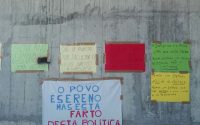Portugal // Council of Medical Schools defends the shutdown of factories, civil construction and all non-essential activities~ 4 min
The Council of Portuguese Medical Schools (CEMP) released a statement this Wednesday with several recommendations, of which we highlight:
- Shutdown of all non-essential activities, including factories and civil construction;
- Mandatory quarantine of all people arriving in the country;
- Massive testing;
- Strengthen investment on the National Health System;
- Widespread use of protective gear.
The CEMP considers that it has “a civic duty to intervene” and that it enjoys “total independence from political power”, making these recommendations “with the public good as its only aim”. The truth is that up until now, it has been the only institution defending certain measures which, despite going against huge economic interests, can be decisive for our collective health and to achieve a less tragic outcome to this pandemic.
Shutdown of all non-essential activities
“The shutdown of all non-essential activity is recommended, including the shutdown of factories, civil construction activity and others that practically still remain working normally.” This strategy is proposed as a way to make social isolation more effective. The fact that a fair number of people are still circulating is pointed out as one of the disease propagation vectors.
The CEMP had already made public on March 12th an open letter to the prime-minister in which it stated that more restrictive measures were needed to control this pandemic. It pointed to the need to replicate the practices that showed good results in China, Macao and South Korea (like restriction of movement between provinces and the lock-down of affected cities), listening to international experts with successful experiences when needed.
At that time there was no reference to shutting down non-essential activities, claiming that measures needed to be decided from a perspective of prevention rather than as a reaction to the development of the crisis. It warned that this was not the time to “let time sensitive decisions be constrained by ideological questions or worries concerning the unavoidable economic impact”.
Now, with cases confirmed in several dozens of municipalities and local transmission starting to be registered in several places, even more drastic measures are needed, like the shutdown of all non essential activities. As we have been saying, there is no point to the working class to keep risking its health and that of their communities just so that non essential sectors of the economy can keep operating. Our collective health must be placed ahead of profit.
Mandatory quarantine for people arriving in the country
The CEMP recommends a “mandatory quarantine of 15 days for everyone arriving in the country, namely emigrants”. Although it might seem a drastic measure, it is clearly becoming needed. During the last week the first confirmed cases started appearing in the interior of the country, some of them being recently arrived emigrants. Although many are aware of the severity of the situation, completely irresponsible situations have been encountered, especially considering these regions mostly have an elderly population.
The first case in the district of Beja, for example, is a constructor worker and emigrant in France, recently returned to the Almodôvar municipality. The case has caused great worry in Beja’s hospital services after it was established that the individual maintained intense social interactions in the week before his test results were known.
It is precisely the fact that there is such an elderly population that led the districts of Bragança, Guarda and Castelo Branco to go even further and declare a mandatory quarantine to whoever arrives in the district from other parts of the portuguese territory.
Massive testing
The CEMP follows the recommendations of the WHO and states that this strategy allows the detection of more cases, identifying and isolating contagion sources and therefore slowing the epidemic. It points to countries such as South Korea as examples of the good results of this strategy. It estimates that by tripling the number of daily tests we are currently performing in Portugal, it would be possible to reduce by about 900 the hospital admissions in the ten following days, with a matching impact in the spreading of the disease as well as in the overload on health services. It also recommends the routine testing of professionals at risk, particularly health workers.
Strengthen investment on the national health system
The CEMP asks for a “significant increase in the budget for the Health Ministry” to carry out an appropriate reequipment of health structures and to assure enough protective gear for health workers.
Widespread use of protective material
The CEMP recommends the population to use individual protection gear, like masks, in order to reduce the risk of infection. “It has been shown that 4 out of 5 of infectious individuals did not know they were infected when they infected other people. The experience of countries like China, Macao, Taiwan, Singapura, South Korea, is very consistent.”
The full CEMP statement can be read in full here (Portuguese).




